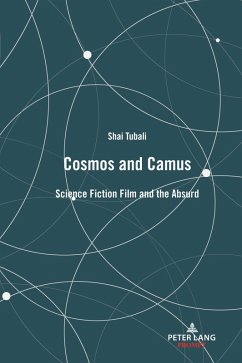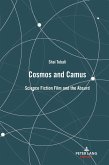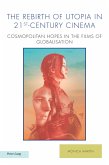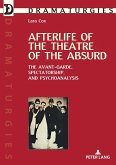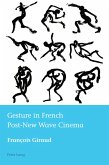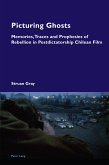Over the last two decades, philosophers have been increasingly inclined to consider science fiction films as philosophical exercises that center on the nature of human consciousness and existence. Albert Camus' philosophy of the absurd, however, has almost never been employed as a constructive perspective that can reveal unexplored aspects of these films. This is surprising, since science fiction films seem to be packed with visions and dialogues that echo the Sisyphean universe.
Cosmos and Camus endeavors to set foot in this uncharted terrain. Its first part introduces the main components of Camus' absurdity so that it can be easily applied to the analysis of the films later. Equipped with these Camusean essentials, the book delves into an indepth analysis of two first-encounter films (Contact and Arrival) and two A.I. films (A.I. and Her). These analyses yield more than an insightful reflection of the absurd contents in science fiction film. Indeed, imaginative collisions with nonhumans seem to tell us a lot about the nature of the absurd in the human condition, as well as raising the question of whether absurdity is exclusively a human matter. Ultimately, the interpretation of the films illuminates the films themselves just as much as it illuminates, challenges, and expands Camus' concept of absurdity.
Cosmos and Camus endeavors to set foot in this uncharted terrain. Its first part introduces the main components of Camus' absurdity so that it can be easily applied to the analysis of the films later. Equipped with these Camusean essentials, the book delves into an indepth analysis of two first-encounter films (Contact and Arrival) and two A.I. films (A.I. and Her). These analyses yield more than an insightful reflection of the absurd contents in science fiction film. Indeed, imaginative collisions with nonhumans seem to tell us a lot about the nature of the absurd in the human condition, as well as raising the question of whether absurdity is exclusively a human matter. Ultimately, the interpretation of the films illuminates the films themselves just as much as it illuminates, challenges, and expands Camus' concept of absurdity.
Dieser Download kann aus rechtlichen Gründen nur mit Rechnungsadresse in A, D ausgeliefert werden.
«Existentialism is being re-evaluated across the humanities and its importance for the study of cinema has never been more obvious. Shai Tubali's timely book offers an interpretation of four science fiction films - Contact, Arrival, A.I. and Her - in terms of Albert Camus' discussion of the absurd in The Myth of Sisyphus. The work demonstrates the contemporary relevance of Camus' ideas and presents a fascinating analysis of the films that shows how they interrogate the very limit of being human. In a world where the disjunction between human endeavour and the brute reality of existence has never been more clearly apparent, Tubali offers us a new way of imagining life.» (Dr David Sorfa, Senior Lecturer in Film Studies, University of Edinburgh)
«This original monograph is a lucid and engaging contribution to both Camus Studies and the philosophy of science fiction. The interpretation of the science fiction films illuminates and expands Camus' concept of absurdity, thus contributing to our current understanding of what the absurd reality is and how we can either live with it or transcend it. This will become a highly valuable insight in the post-modern years to come.» (Jacob Golomb, Professor (Emeritus) in Philosophy, The Hebrew University of Jerusalem, author of In Search of Authenticity: From Kierkegaard to Camus)
«Art is perhaps the most powerful means of creating an awareness of the absurdity of our condition. Yet, attempts to relate absurdist philosophy to actual works of art have so far been rare. Shai Tubali's Cosmos and Camus: Science Fiction Film and the Absurd provides a model of how to fill this void. The book's first part develops an interpretation of Camus' theory of the absurd. Then Tubali skillfully analyzes four science-fiction films in light of this theory. The resulting considerations will not only increase readers' understanding of these films but also of Camus' philosophy and of our place in the universe.» (Thomas Pölzler, Department of Philosophy, University of Graz, author of Moral Reality and the Empirical Sciences)
«Tubali's fascinating book explores the relevance of Albert Camus' philosophy of the absurd to cinematic science fiction - a connection that has regrettably been largely neglected within both Camus scholarship and philosophy of film until now. Tubali homes in on Camus' claim that works of art are valuable mediums for communicating philosophical problems, demonstrating persuasively that sci-fi, in its ability to hold a mirror up to humanity, effectively communicates 'the feeling of the absurd' (which was, as Sartre suggested, Camus' own aim in writing L'Étranger). Unpacking, as it does, yet another dimension of Camus' literary-philosophical venture, this insightful book represents a substantial contribution to the literature, and I personally hope to see more of its kind.» (Dr Grace Whistler, author of Camus' Literary Ethics: Between Form and Content and "The Absurd" in Brill's Companion to Camus)
«The intersections of film and philosophy have long been the subject of a rich, interdisciplinary academic literature, which has recently seen explosive growth. Cosmos and Camus is one of the most impressive contributions to this field that I have read in years. After a highly systematic and engagingly written exposition of Camus' work on the absurd, the book offers strikingly original and compelling interpretations of four science fiction films. Cosmos and Camus explores the many ways in which philosophy and films can illuminate the human condition and each other.» (Peter Krämer, Senior Research Fellow in Cinema & TV in the Leicester Media School at De Montfort University, Leicester (UK), and author of BFI Film Classics on 2001: A Space Odyssey and Dr Strangelove)
«This original monograph is a lucid and engaging contribution to both Camus Studies and the philosophy of science fiction. The interpretation of the science fiction films illuminates and expands Camus' concept of absurdity, thus contributing to our current understanding of what the absurd reality is and how we can either live with it or transcend it. This will become a highly valuable insight in the post-modern years to come.» (Jacob Golomb, Professor (Emeritus) in Philosophy, The Hebrew University of Jerusalem, author of In Search of Authenticity: From Kierkegaard to Camus)
«Art is perhaps the most powerful means of creating an awareness of the absurdity of our condition. Yet, attempts to relate absurdist philosophy to actual works of art have so far been rare. Shai Tubali's Cosmos and Camus: Science Fiction Film and the Absurd provides a model of how to fill this void. The book's first part develops an interpretation of Camus' theory of the absurd. Then Tubali skillfully analyzes four science-fiction films in light of this theory. The resulting considerations will not only increase readers' understanding of these films but also of Camus' philosophy and of our place in the universe.» (Thomas Pölzler, Department of Philosophy, University of Graz, author of Moral Reality and the Empirical Sciences)
«Tubali's fascinating book explores the relevance of Albert Camus' philosophy of the absurd to cinematic science fiction - a connection that has regrettably been largely neglected within both Camus scholarship and philosophy of film until now. Tubali homes in on Camus' claim that works of art are valuable mediums for communicating philosophical problems, demonstrating persuasively that sci-fi, in its ability to hold a mirror up to humanity, effectively communicates 'the feeling of the absurd' (which was, as Sartre suggested, Camus' own aim in writing L'Étranger). Unpacking, as it does, yet another dimension of Camus' literary-philosophical venture, this insightful book represents a substantial contribution to the literature, and I personally hope to see more of its kind.» (Dr Grace Whistler, author of Camus' Literary Ethics: Between Form and Content and "The Absurd" in Brill's Companion to Camus)
«The intersections of film and philosophy have long been the subject of a rich, interdisciplinary academic literature, which has recently seen explosive growth. Cosmos and Camus is one of the most impressive contributions to this field that I have read in years. After a highly systematic and engagingly written exposition of Camus' work on the absurd, the book offers strikingly original and compelling interpretations of four science fiction films. Cosmos and Camus explores the many ways in which philosophy and films can illuminate the human condition and each other.» (Peter Krämer, Senior Research Fellow in Cinema & TV in the Leicester Media School at De Montfort University, Leicester (UK), and author of BFI Film Classics on 2001: A Space Odyssey and Dr Strangelove)

